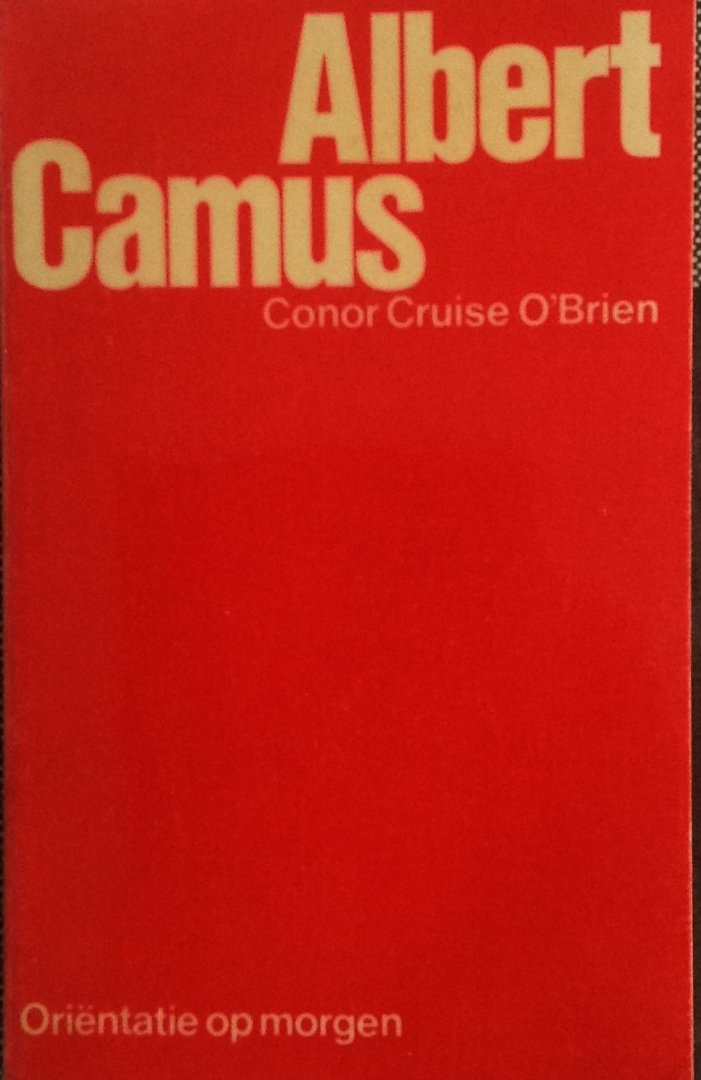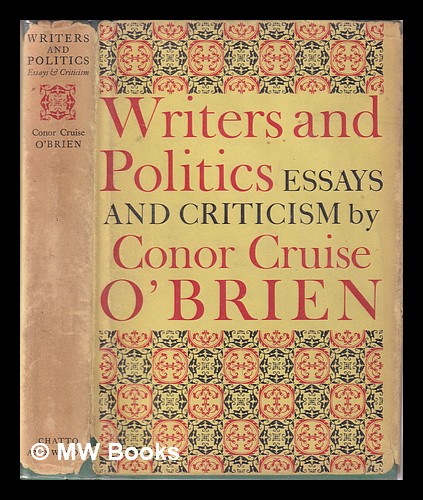Table Of Content
- Police Powers
- Conor Cruise O’Brien dies at 91; Irish author became a prominent diplomat
- More From the Los Angeles Times
- Tony Felloni, notorious Dublin heroin dealer, dies suddenly aged 81
- Israeli strikes intensify across Gaza as fresh evacuations ordered in north of enclave
- Ireland's Fissures, and My Family's

(When you heard that distinctive Irish voice squeakily address you as "party comrade", it was usually time to go home.) Few things afforded me greater pleasure than helping to get Conor named Commentator of the Year in the 1983 What The Papers Say awards. This coincided, though I did not realise it at the time, with the final push by Lonrho to get the paper's most illustrious contributor removed from any connection with the Observer - a demand which I shall always believe that the entire staff, from the editor downwards, should have combined to resist. Conor's enforced departure was dressed up as having something to do with his acceptance of a visiting professorship at Dartmouth College in New Hampshire - and face, if not pride, was thereby preserved. A government announcement Thursday did not give the cause of death, although Cruise O'Brien had faded from public life since suffering a stroke in 1998 and several broken bones from a fall in 2007. 94 Power, ‘Revisionist nationalism's consolidation, republicanism's marginalization, and the peace process’, p. 90.
Conor Cruise O'Brien, 1917-2008 The Chicago Blog - University of Chicago
Conor Cruise O'Brien, 1917-2008 The Chicago Blog.
Posted: Fri, 19 Dec 2008 08:00:00 GMT [source]
Police Powers
Your email address will be used in order to notify you when your comment has been reviewed by the moderator and in case the author(s) of the article or the moderator need to contact you directly. See also Ivory, ‘Revisions in nationalist discourse among Irish political parties’, pp 89–90. 61 O'Brien, ‘Report of party delegation to Six Counties and the British Labour Party – 16/19 August 1969’. Elements within the Belfast Citizens’ Defence Committees would later form part of the Central Defence Committees, which would go on to form the nucleus of the P.I.R.A. See Kelly, ‘A failed political entity’, p. 65. His dramatic writings include King Herod explains (1968), in which Hilton Edwards (qv) played Herod at the Gate theatre in 1971; Murderous angels (1968), on the prelude to Katanga; and unpublished screenplays on Parnell and Michael Collins (qv). He was pro-chancellor of the University of Dublin (1972–94), a member of the RIA, and was awarded numerous honorary doctorates, including from QUB in 1984.

Conor Cruise O’Brien dies at 91; Irish author became a prominent diplomat
Two additional notable incidents affected Cruise O'Brien's career as minister, besides his support for broadcasting censorship. In 1962, Cruise O'Brien married the Irish-language writer and poet Máire Mhac an tSaoi in a Roman Catholic church. Cruise O'Brien's divorce, though contrary to Roman Catholic teaching, was not an issue because that church did not recognise the validity of his 1939 civil wedding.
Irish diplomat Conor Cruise O'Brien dies - SFGATE
Irish diplomat Conor Cruise O'Brien dies.
Posted: Sun, 21 Dec 2008 08:00:00 GMT [source]
More From the Los Angeles Times
Cruise O'Brien accused a combination of British, French and white Rhodesian elements of attempting to partition off Katanga as a pro-Western client state. He used military force to oppose a combination of western mercenaries and Katangan forces. Days after he green-lighted the aggression, as the Siege of Jadotville raged, Hammarskjöld was killed in a plane crash, leaving Cruise O'Brien to carry the can. He was swiftly let go by the UN, at the request of the Irish government, and he resigned from the diplomatic corps. Cruise O'Brien's version of events, set out in his 1962 book To Katanga and Back, has been dismissed as highly selective and self-serving, and while it deliberately excluded crucial items, recent evidence from the UN archives suggests Cruise O'Brien was acting with the express approval of Hammarskjöld.
Like Charles Haughey, who would become his bête noire in later life, Cruise O'Brien was a star scholar who breezed through academic life nearly always at the top of the class. The Belgians turned the Congo into a real-life hell on Earth, and when they pulled out in 1960, they left behind an unholy mess which the Irish, wearing their UN berets alongside a force of Swedes, were supposed to somehow sort out. Over a five-year period some 6,000 Irish soldiers served in the Congo, with 26 of them killed in action. Conor Cruise was posted to the Congo in 1961 as the special representative of the United Nations' charismatic Secretary General Dag Hammarskjöld. He was still in his early forties and he already had a glittering career behind him. Contributor of articles to periodicals, including Atlantic, Nation, New Statesman, and Saturday Review.
Holy War Against India
O'Brien recognised that in the post-Morthor furore he should leave his assignment in Élisabethville so as not to jeopardise the prospects of reconciliation, but wanted to be assigned to Léopoldville as the senior political adviser to the ONUC chief of civilian operations rather than be reassigned to a role in New York. He left for New York on 16 November, leaving Máire MacEntee in Élisabethville, where she had joined him a couple of weeks previously. At the security council, the Belgian foreign minister Paul Henri Spaak denounced O'Brien for having pursued 'a personal policy', and 'grossly exceeded instructions'. Paradoxically, this fortified O'Brien's position; however, it was almost immediately destabilised by what transpired in Élisabethville on 28 November. Katangese paracommandos apprehended a party en route to a reception in honour of US Senator Thomas Dodd of Connecticut, a backer of Tshombe.

He condemned killing and maiming conducted by both sides and, while serving in the mid-1970s as minister overseeing Irish broadcasting outlets, he banned Irish Republican Army statements from Irish radio and television. Stocky, urbane and outspoken, “The Cruiser” as he was known to friends, wrote influential books and essays on many subjects; his works include “The Great Melody,” a 1981 biography of British statesman and philosopher Edmund Burke, and “The Siege,” a 1986 history of Israel and Zionism. One of Conor Cruise O'Brien's favourite anecdotes arose from the time some 30 years ago when he was being courted by the Observer to become its editor-in-chief. The message had been passed to him that he should present himself at a distinctly smart block of flats opposite Broadcasting House in Portland Place. There he was to be interviewed by, among others, the former chairman of the paper, the ubiquitous lawyer Arnold Goodman.
Israeli strikes intensify across Gaza as fresh evacuations ordered in north of enclave
Shortly before Cruise O'Brien arrived, the crisis in the region was made far worse after the murder of the newly independent Congo's first democratically elected prime minister, Patrice Lumumba. The rulers of one province, Katanga, opted to secede from the newly formed Democratic Republic of the Congo. Although they had officially abandoned their old colony, the Belgians were still anxious to cash in on the great natural resources of the country, and Katanga was a land rich in those resources. It is one of history's great ironies that thousands of Irishmen marched off to the trenches of the Great War on a mission to save "little Catholic Belgium" from German oppression, at a time when Belgium, as colonial master of the Congo basin since the 1880s, was presiding over one of the most brutal and genocidal regimes the world has ever seen. New Republic, September 11, 1965; September 7, 1968; March 3, 1986; September 12, 1988; March 10, 1997, Sean Wilentz, review of The Long Affair, p. 32. Nation, December 20, 1965, p. 502; February 23, 1970; March 27, 1972; March 12, 1973; May 26, 1997, Benjamin Schwartz, review of The Long Affair, p. 29.
Towards the end of his life his principal journalistic outlet was the Sunday Independent. Professionally he was once again with the loss of his dáil seat on the qui vive. Late in 1977 he embarked on an extended African trip for the Observer, and had a memorable encounter with the Zimbabwean revolutionary Robert Mugabe, who asked him if he supported freedom fighters in his own country. O'Brien replied that if Mugabe meant the Provisional IRA, he had not supported them but favoured their suppression by all lawful means. Mr Mugabe smiled as he spoke.' Mugabe was incensed on the publication of O'Brien's account in January 1978.
After his stint as editor-in-chief of the Observer, O'Brien earned his living by his journalistic writing, by contributions to international reviews and by his books, and had a series of visiting lectureships in American academic institutions. Though immersed in its public life in a period of bracing political and artistic vibrancy, the O'Briens were never quite settled in New York. With the adoption of Patrick, Whitewater, the house which O'Brien had purchased in 1950 on the summit of Howth, overlooking the Baily lighthouse, with the glittering sweep of Dublin bay to the right, once more beckoned.
Born in Dublin in 1917, Mr Cruise O'Brien was one of the leading intellectual lights of the Labour Party during the 1960s, following a career as a civil servant in the Department of Finance and later the Department of External Affairs. Secretary-General Dag Hammarskjold, both of whom figured largely in O’Brien’s career and propelled him to diplomatic roles after Ireland’s admission to the United Nations in 1955. It was a shabby episode in the history of the Observer and no one surviving from that time can afford to look back without a twinge of guilt.
His involvement on the anti-partition side ceased with his appointment to the Irish embassy in Paris, where he was counsellor (1955–6). In 1969, as a Labor candidate, he won a seat in Ireland’s Parliament representing Dublin Northeast. Regarded as left-wing by Irish voters, he soon surprised many of his supporters with the provocative and highly influential book “States of Ireland” (1972), in which he attacked what he saw as the myths of the Republican movement and excoriated the nationalist dream as sectarian and colonialist. As minister of posts and telegraphs in the coalition government that formed in 1973, he banned Sinn Fein from the airwaves.


No comments:
Post a Comment